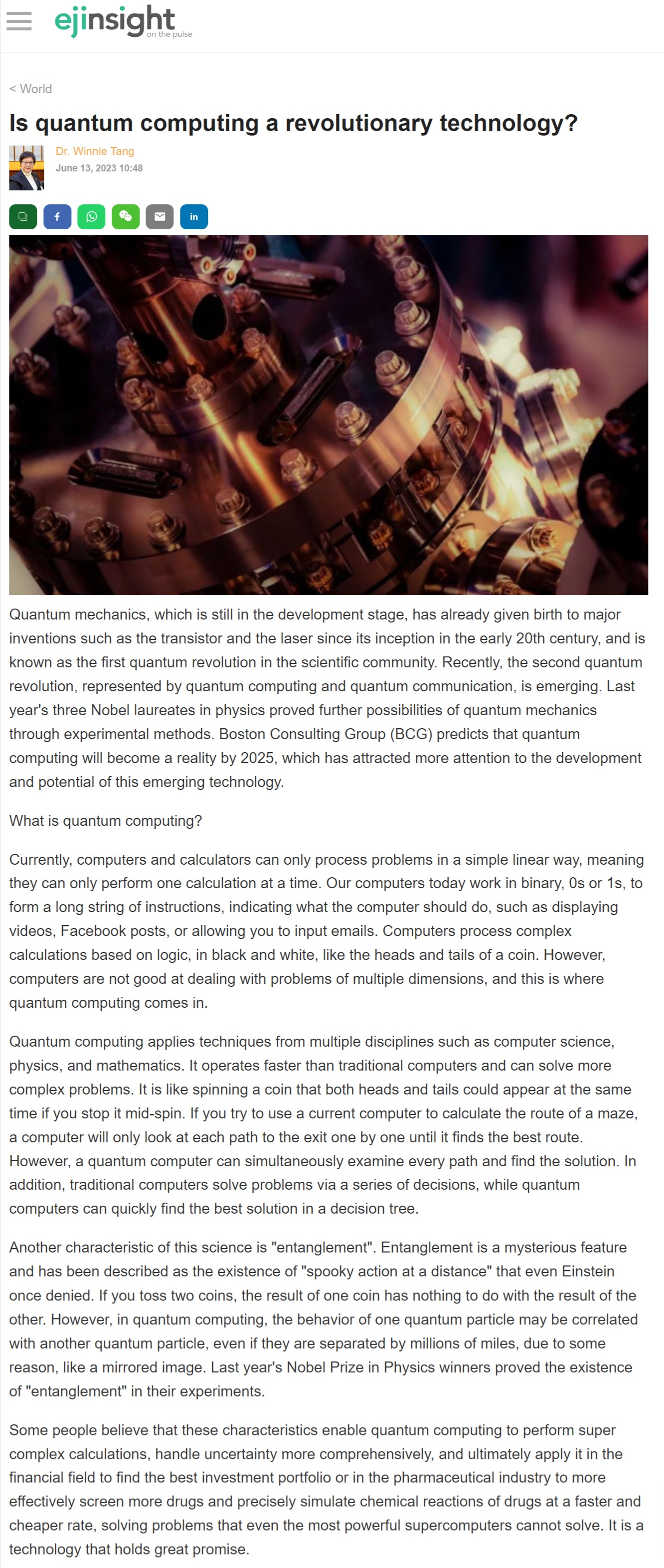網上版請按此

Is quantum computing a revolutionary technology?
Quantum mechanics, which is still in the development stage, has already given birth to major inventions such as the transistor and the laser since its inception in the early 20th century, and is known as the first quantum revolution in the scientific community. Recently, the second quantum revolution, represented by quantum computing and quantum communication, is emerging. Last year's three Nobel laureates in physics proved further possibilities of quantum mechanics through experimental methods. Boston Consulting Group (BCG) predicts that quantum computing will become a reality by 2025, which has attracted more attention to the development and potential of this emerging technology.
What is quantum computing?
Currently, computers and calculators can only process problems in a simple linear way, meaning they can only perform one calculation at a time. Our computers today work in binary, 0s or 1s, to form a long string of instructions, indicating what the computer should do, such as displaying videos, Facebook posts, or allowing you to input emails. Computers process complex calculations based on logic, in black and white, like the heads and tails of a coin. However, computers are not good at dealing with problems of multiple dimensions, and this is where quantum computing comes in.
Quantum computing applies techniques from multiple disciplines such as computer science, physics, and mathematics. It operates faster than traditional computers and can solve more complex problems. It is like spinning a coin that both heads and tails could appear at the same time if you stop it mid-spin. If you try to use a current computer to calculate the route of a maze, a computer will only look at each path to the exit one by one until it finds the best route. However, a quantum computer can simultaneously examine every path and find the solution. In addition, traditional computers solve problems via a series of decisions, while quantum computers can quickly find the best solution in a decision tree.
Another characteristic of this science is "entanglement". Entanglement is a mysterious feature and has been described as the existence of "spooky action at a distance" that even Einstein once denied. If you toss two coins, the result of one coin has nothing to do with the result of the other. However, in quantum computing, the behavior of one quantum particle may be correlated with another quantum particle, even if they are separated by millions of miles, due to some reason, like a mirrored image. Last year's Nobel Prize in Physics winners proved the existence of "entanglement" in their experiments.
Some people believe that these characteristics enable quantum computing to perform super complex calculations, handle uncertainty more comprehensively, and ultimately apply it in the financial field to find the best investment portfolio or in the pharmaceutical industry to more effectively screen more drugs and precisely simulate chemical reactions of drugs at a faster and cheaper rate, solving problems that even the most powerful supercomputers cannot solve. It is a technology that holds great promise.
Dr. Winnie Tang
Adjunct Professor, Department of Computer Science, Faculty of Engineering; Department of Geography, Faculty of Social Sciences; and Faculty of Architecture, The University of Hong Kong